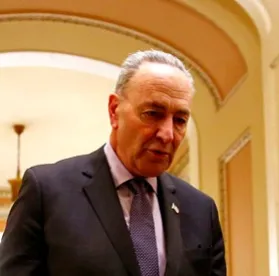This Week's Dose
Senate Democrats reach partisan agreement on human infrastructure package. Centers for Medicare and Medicaid Services (CMS) release proposed physician payment rule that addresses coverage for telemedicine services and reduces the conversion factor by 3.75%. Biden directs agencies to consider reforms to enhance competition.
Congress
Senate Democrats Announced $3.5 Trillion Human Infrastructure Package. Senate Majority Leader Chuck Schumer announced the package late Tuesday night, which represents Biden Administration priorities that Democrats will seek to push through using a second attempt at reconciliation. While Democrats have not yet released any legislative text or itemized breakdowns of how the $3.5 trillion will be spent, initial reports indicate that the package will expand Medicare benefits to cover dental, hearing and vision services and address the Medicaid coverage gap in non-expansion states. There are also likely to be numerous policies focused on the Administration’s climate priorities, including investments in clean energy and reducing carbon emissions, as well as funding for childcare, paid family leave and community college. The package is rumored to be paid for in part by tax and prescription drug pricing policies, including repeal of the Trump Era “rebate rule,” which sought limit the use of rebates offered by pharmacy benefit managers. These numbers mark the beginning of a potentially lengthy and strategically tenuous process where Democratic leaders will try to shepherd two significant spending packages on the thin majorities. Leader Schumer is pushing to get a bipartisan physical infrastructure package moving in the Senate next week, opening debate as early as Wednesday. Meanwhile, the House has begun the process of moving 12 appropriations bills ahead of the August recess. The House plans to pass a “minibus” with seven appropriations bills (including Labor, Health and Human Services) next week, which the Senate will also have to eventually consider, making for a crowded agenda heading into fall.
Administration
CMS Released CY 2022 Medicare Physician Fee Schedule (PFS) Proposed Rule. The annual regulation includes proposals related to Medicare physician payment and the Quality Payment Program (QPP). CMS proposed a physician conversion factor (CF) of $33.5848, representing a 3.75% reduction from the 2021 CF of $34.8931. However, Congress would likely need to act to increase the conversion factor to mitigate the negative impact of this reduction on care. The rule also proposed extending coverage of certain services temporarily added to the Medicare Telehealth Services List during the pandemic to the end of CY 2023, though Congressional action on originating and geographic site restrictions is required to make those policies meaningful to most beneficiaries if the public health emergency were to end. Other proposals include an update to underlying clinical labor cost data used to calculate the practice expense portion of Medicare physician payment that may have a disproportionate positive impact on certain specialties with higher-than-average share of clinical labor costs, and a launch date of CY 2023 for the previously delayed Merit-based Incentive Payment System (MIPS) Value Pathways program which is designed as an alternative to MIPS. The agency is seeking comments on a proposal to potentially sunset the traditional MIPS by end of 2027. The agency also included a request for information on its health equity data collection initiative, which is designed to give providers a more comprehensive understanding of health disparities impacting their patients. Comments on the rule are due September 13, 2021.
President Biden issues Executive Order (EO) to Promote Competition. On July 9, 2021, President Biden issued an Executive Order on Promoting Competition in the American Economy to address competition and consolidation across the economy. The EO establishes a White House Competition Council, encourages review of licensure requirement and non-competes and identifies four specific areas for the Department of Health and Human Services (HHS) to focus on: hospitals, insurance, prescription drugs and hearing aids. The EO notes that the Administration will support enactment of a public health insurance option. Like all EOs, the policies generally require subsequent regulatory action by government agencies. Though implementation of many of the more substantive policy directives will likely take some time to materialize, we expect these issues to continue to be a focus for the Administration and HHS.
Quick Hits
-
CMS released bulletin on Medicaid coverage of certain medical transport.
-
Updated data standards from the Office of the National Coordinator facilitate exchange of sexual orientation, gender identity and social determinants of health.
-
Center for Medicaid and Chip Services open notice of funding opportunity for mobile crisis response state option planning grants.
-
HHS announced that more than 2 million have enrolled under Biden’s Special Enrollment Period.
-
CMS is holding two stakeholder calls on the National Coverage Determination for Aduhelm. The first will be held on July 22 and the second on July 27.
M+ Resources
On this week’s Breakroom podcast, Sheila Madhani unpacks some of the key takeaways from the CY 2022 Medicare PFS proposed rule.
Next Week's Diagnosis
The FY 2022 Hospital Outpatient Prospective Payment System Rule remains under review at the Office of Management and Budget. Next week, Senate HELP will hold a hearing on COVID-19 updates, and the HELP Retirement subcommittee will look at disparities in life expectancy.



 />i
/>i

